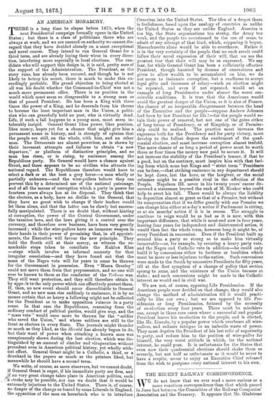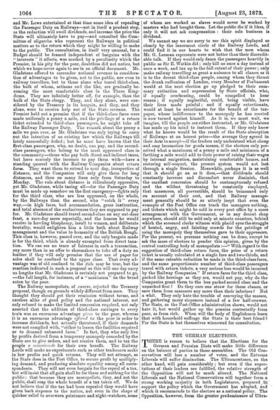THE RECENT RAILWAY CORRESPONDENCE.
WE do not know that we ever read a more curious or a more vexatious correspondence than that which passed in June last between the Committee of the Railway Companies' Association and the Treasury. It appears that Mr. Gladstone
and Mr. Lowe entertained at that time some idea of repealing the Passenger Duty on Railways—not in itself a prudent step, as the redaction will swell dividends, and increase the price the State will ultimately have to pay—and consulted the Com- mittee of oligarchs who represent the Railways in political matters as to the return which they might be willing to make to the public. The consultation, in itself very unusual, for a Budget should be framed independent of bargains with the " interests " it affects, was marked by a peculiarity which the Premier, in his pity for the poor, doubtless did not notice, but which we hope never again to see in an official document. Mr. Gladstone offered to surrender national revenue in considera- tion of advantages to be given, not to the public, nor even to railway travellers, but to those alone who travel third-class, the bulk of whom, artisans and the like, are gradually be- coming the most comfortable class in the Three King- doms. They are infinitely better off, for example, than the bulk of the State clergy. They, and they alone, were con- sidered by the Treasury in its bargain, and they, and they alone, were to receive help out of the State revenue. The Premier held out a promise that if the third-class fares were made uniformly a penny a mile, and the privilege of a return ticket extended to third-class passengers, he might take off the Railway Passenger Duty. The remark about the penny a mile we pass over, as Mr. Gladstone was only trying to carry out the intention of an existing law which the Railways till lately successfully defied ; but he must have known that the first-class passengers, who, no doubt, can pay, and the second- class passengers, who belong to the most oppressed class in the community—those who pay both direct and indirect taxes, but have scarcely the incomes to pay them with—have a standing quarrel with the Railway Companies about return fares. They want them to extend to next day, irrespective of distance, and the Companies will only give them for long distances, and then on many lines only from Saturday to Monday. The role about distance is ridiculously oppressive, yet Mr. Gladstone, while taxing all—for the Passenger Duty must be made up somehow on the first emergency—fights only for the third class, who are less oppressed, on the whole, by the Railways than the second, who "catch it " every way,—in high fares, bad accommodation, gross inattention, and total absence of the exclusiveness they are supposed to pay for. Mr. Gladstone should travel second-class on any out-door feast, a race-day more especially, and the lessons he would receive in howling blasphemy, insult to women, and deliberate brutality, would enlighten him a little both about Railway management and the value to humanity of the British Rough. This class is, however, passed over, and the only bargain made is for the third, which is already exempted from direct taxa- tion. We can see no trace of fairness in such a transaction, any more than in an offer to shoemakers to take off a duty on leather if they will only promise that the use of paper for soles shall be confined to the upper class. That every ad- vantage was of old confined to the rich may be true, but the reaction indicated in such a proposal as this will one day carry us lengths that Mr. Gladstone is certainly not prepared to go, —the full length, for instance, of a "maximum" on the bread eaten by the poor.
The Railway monopolists, of course, rejected the Treasury proposal, though on grounds widely different from ours. They thought they should get their remission without terms, and careless alike of good policy and the national interest, not only refused to make the limited concession required, not only asserted that the addition of third-class carriages to every train was an enormous advantage given to the poor, whereas it is an enormous advantage offered to the poor in order to increase dividends, but actually threatened, if their demands were not complied with, "either to lessen the facilities required or to demand enhanced fares." In fact, they who only live by profits derived from a temporary monopoly conceded by the State are to give orders, and not receive them, and to tax the people a misericorde for their own benefit. The Railway Lords will make no experiments such as other tradesmen make in low profits and quick returns. They will not attempt, as the State does in the Post Office, to secure profit by multiply- ing demand, and producing absolute equality among all corre- spondents. They will not even bargain for the repeal of a tax, but will insist that all gain shall be for them and nothing for the public ; that because they are monopolists, they, and not the public, shall reap the whole benefit of a tax taken off. We do not believe that if the tax had been repealed they would have given back sixpence to the nation, not even in the shape of quicker relief to overworn pointsmen and night-watchers, some
of whom are worked as slaves would never be worked by masters who had bought them. Let the public die if it likes, if only it will not ask compensation : their sole business is dividend.
We cannot say we are sorry to see this spirit displayed so clearly by the innermost circle of the Railway Lords, and could find it in our hearts to wish that the men whom Mr. G. Leeman represents were not better than their discredit- able talk. If they would only damn the passengers heartily in public as Sir E. Watkin did ; only kill us once a day instead of once a week, and tax up to the full extent of their power ; only make railway travelling as great a nuisance to all classes as it is to the decent third-class people, among whom they thrust the drunk ruffianism of London, every Member of Parliament would at the next election go up pledged to their sum- mary extinction and supersession by State officials, who, if equally overbearing, could be compelled to hear reason ; if equally neglectful, could, being visible, have their lives made painful ; and if equally extortionate, would at least be extortionate for the benefit of the tax- payer, whose indifference to the monopoly he has created is now turned against himself. As it is, we must wait, we imagine, till the people are either instructed, or Mr. Gladstone has made up his mind to instruct them. If they only knew what he knows would be the result of the State absorption of Railways at an honest price—the average they agreed in
their Acts to accept=if the traders only understood what cheap and easy locomotion for goods means, if the electors only per- ceived what a maximum of a penny a mile and minimum of a
farthing a mile would add to their power of raising their wages by internal emigration, maintaining comfortable homes, and restoring self-respect, the present system would not last through a single Session. Meanwhile, perhaps it is as well that it should go on as it does,—that dividends should constantly increase and discomfort never diminish, that the smallest concession should be contemptuously refused and the wildest threatening be constantly employed, that massacres, all preventible, should be bemoaned- only on account of their cost, and that Railway manage- ment generally should be so utterly inept that even the example of the Post Office can teach the managers nothing, and tickets which might be sold in every post office by a mere arrangement with the Government, or in any decent shop anywhere, should still be sold only at minute counters, behind which the screened clerks witness with placid eyes the struggle of heated, angry, and fainting crowds for the privilege of using the monopoly they themselves gave to their oppressors.
For the present, we presume nothing can be done, except to ask the mass of electors to ponder this opinion, given by the central controlling body of monopolists :—" With regard to the suggestion of third-class return fares, the price of a return ticket is usually calculated at a single fare and two-thirds, and if the same rateable reduction be made in the third-class fares, and the same proportionate number of third-class passengers travel with return tickets, a very serious loss would be incurred by the Railway Companies." If return fares for the third class, packed like herrings as they are, would not pay, why do the Companies grant them to the less packed second class and the unpacked first Do they care one straw for these classes, or save them from massacre any more than their inferiors ? Not a whit. They only hate the trouble of conveying the masses, and gathering many sixpences instead of a few half-crowns. The State, as the Post-Office administration shows, would not hate it, but would gather up the pennies contentedly from poor, as from rich. When will the body of Englishmen learn that with household suffrage the State is their best friend? For the State is but themselves winnowed for consultation.































 Previous page
Previous page